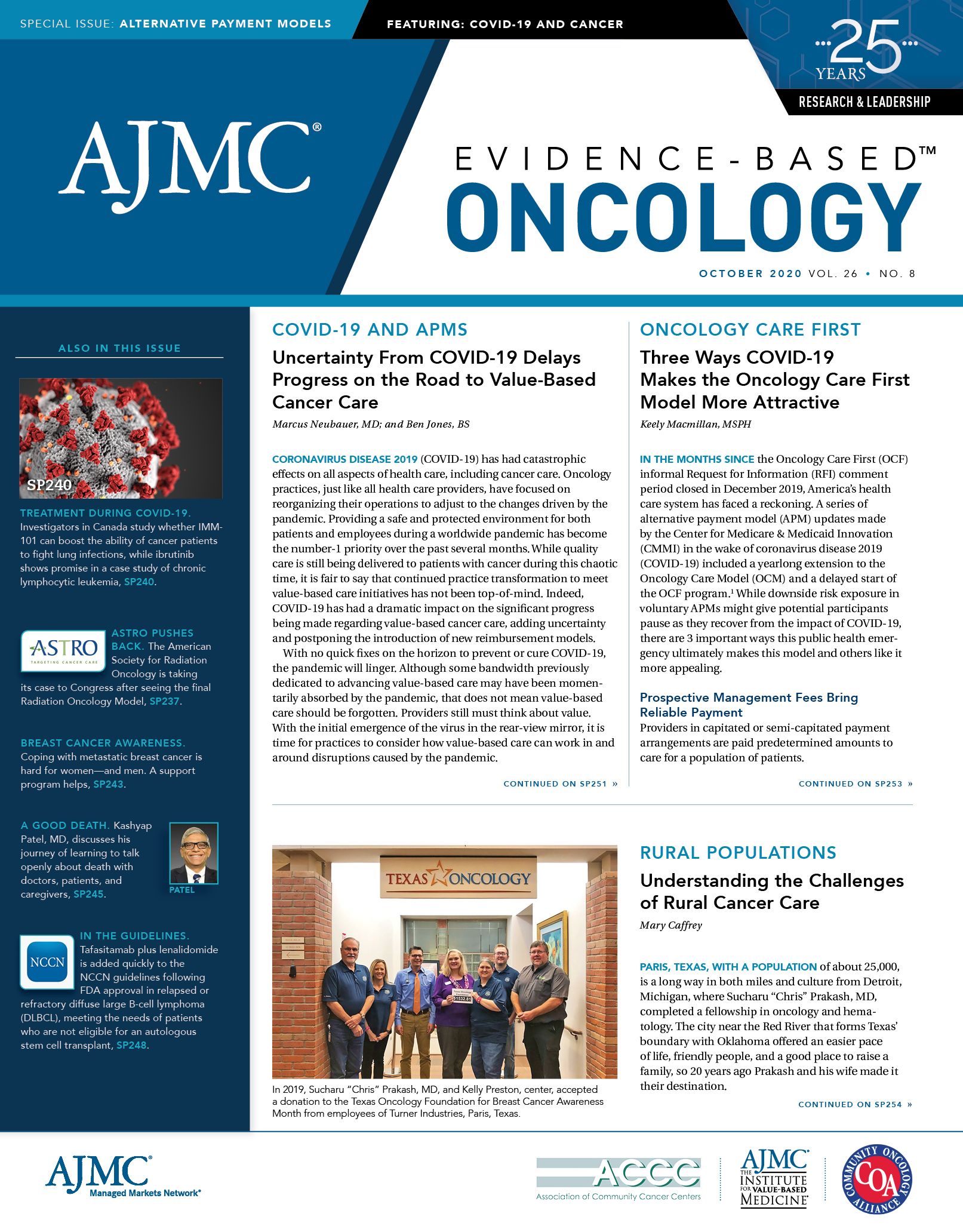- Center on Health Equity & Access
- Clinical
- Health Care Cost
- Health Care Delivery
- Insurance
- Policy
- Technology
- Value-Based Care
Connecting the Dots
Creativity is just connecting things--Steve Jobs
https://doi.org/10.37765/ajmc.2020.88566
Shortly after his biography of Steve Jobs, Walter Isaacson wrote an article summarizing the leadership lessons gleaned from his experiences with this visionary. Some imperatives that Isaacson identified: the importance to “focus, simplify, take responsibility end to end, when behind leapfrog...bend reality, impute, combine the humanities with the sciences, stay hungry/stay foolish, know both the big picture and the details.”1 At this time of immense innovation in cancer care, these lessons are both timely and essential. We are living through a hyperdynamic period of change in how we define cancer types and how we select therapeutics. Advances in genomic testing, targeted therapeutics, and immuno-oncology have fundamentally changed how we practice.
Yet all is not well. Disparities in care access and patient survival outcomes persist. These include barriers to care for patients living in rural areas and barriers due to poverty and educational gaps.
Moreover, the challenge of how to sustainably manage the escalating care costs of managing oncology patients remain unresolved.2 Attempts to bend the cost curve, such as CMS’ Radiation Oncology Model, may bring unintended consequences and increase the complexity of care delivery. And now, as we try to manage all of these existing systemic challenges, coronavirus disease 2019 (COVID-19) has increased demands upon health systems and clinicians to serve patients for whom delays in care may translate into a reduced chance of survival.3
How can we transcend these challenges and ensure that our system evolves so that it can more equitably, effectively, and sustainably serve the needs of patients and families? A wise first step may be following the wisdom of Mr. Jobs in better connecting the immense resources and capacities of our system in ways that make care more accessible to those who need it, more patient-centric, and ensure more effective stewardship over care resources. To some extent, this will require that we simplify our system so that unnecessary barriers to care and care delivery are removed. It will require that systems more effectively leverage communication technologies to improve patient access while ensuring that payers grant reimbursement parity for clinicians who use these technologies effectively. In this edition of Evidence-Based Oncology™, we examine current barriers in cancer care delivery and identify opportunities for moving us above and beyond today’s systemic challenges. In this issue, we review the impact of COVID-19 upon oncology practice and potential paths forward. We examine challenges of access to cancer care in rural areas and continued gaps in access to palliative care. Finally, in our conversation with Kashyap Patel, MD, we seek a rehumanization of care, particularly when a cure may not be possible.
There is some optimistic naiveté in believing that by creating greater connectedness and transparency across the breadth and depth of our cancer care ecosystem that we can change the nature of cancer care. Yet as we navigate the seemingly impossible, endless pain and uncertainties of the COVID-19 pandemic, what is truly striking is the extraordinary resilience and near-infinite adaptability of the clinicians, systems leaders, patients, and families who have persisted in their pursuit of life-saving care. We have witnessed an untold level of creativity in how clinicians have managed through this crisis. This is powerful evidence of where we might go. Inasmuch as the iPhone revolutionized so much about knowledge access, communication, and the creation of robust virtual communities, we have this perspective to remind us of the immense opportunity to similarly re-envision cancer care delivery to improve access, quality, and sustainability. As Steve Jobs said, “Simple can be harder than complex: You have to work hard to get your thinking clean to make it simple. But it’s worth it in the end, because once you get there, you can move mountains.”.
References
1. Isaacson W. The real leadership lessons of Steve Jobs. Harvard Business Review. April 2012. Accessed October 6, 2020. https://hbr.org/2012/04/the-real-leadership-lessons-of-steve-jobs
2. Simoens S, et al. What happens when the cost of cancer care becomes unsustainable? Eur Oncol Haematol. 2017;13(2):108–13. doi: https://doi.org/10.17925/EOH.2017.13.02.108
3. Maringe C, Spicer J, Morris M, et al. The impact of the COVID-19 pandemic on cancer deaths due to delays in diagnosis in England, UK: a national, population-based modelling study. Lancet Oncol. 2020;21:1023. doi: https://doi.org/10.1016/S1470-2045(20)30388-0

Impact of Amivantamab-Lazertinib on EGFR, MET Resistance Alterations in NSCLC: Danny Nguyen, MD
September 15th 2025The combination of amivantamab and lazertinib in first-line non–small cell lung cancer (NSCLC) significantly reduces resistance mechanisms with implications for second-line treatment, said Danny Nguyen, MD, of City of Hope.
Read More
